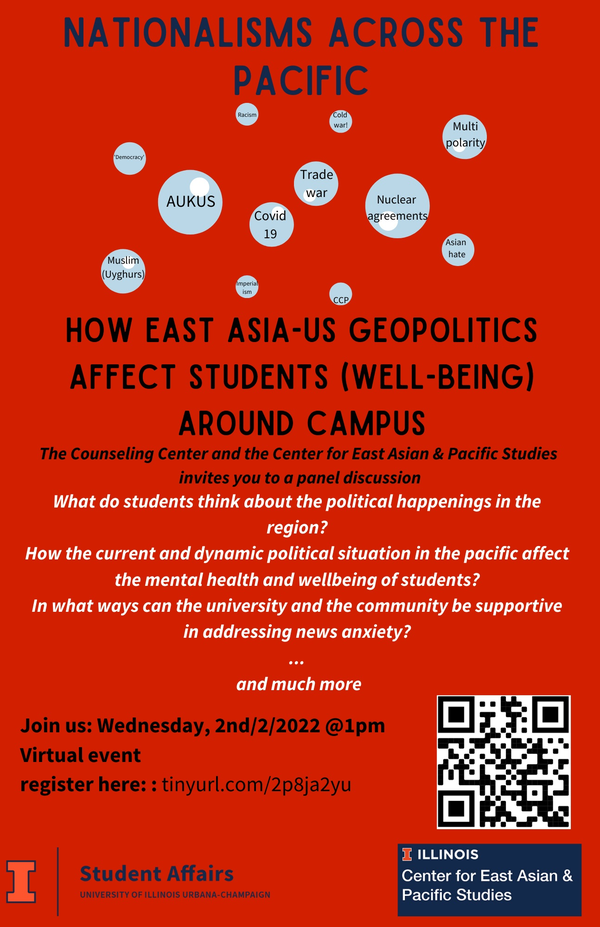This event is co-sponsored by University of Illinois Counseling Center.
It is clear that not a single day passes here in the US without hearing news about China. This stream of news intensified further since the proliferation of COVID-19, but the pandemic is not the sole reason for this media attention. COVID-19 did bring attention to the lingering anti-East Asian prejudice. However, geopolitics also had their share in worsening the lived experiences of East Asians. It can be noted from the US presidential debate, trade war, and the possibility of China surpassing the US in economic growth/size of economy. On the other hand, China has an increasingly antagonistic economic relationship with the US and its allies. All of this intensified to the development of the AUKUS (Australian-British-American alliance) and their nuclear program in the region. This escalation from both sides on the Pacific is quite perilous.
Students, international and domestic, who follow the news and affiliate with these geographic locations and their politics can experience news anxiety. In addition, the inability to speak about these events might deter students to engage in deeper learning about the complex geopolitical history of the region. This event is meant to give space for students to hear from other students who have researched, lived, and interacted with these regions. Furthermore, an integral segment of this event is the discussion and fostering a space where students can listen and learn from one another about the topic and how to tackle news anxiety.
---
Panelists:
Lu Xu, China, EPOL, PhD student
My name is Lu Xu and I come from China. I am pursuing the Ph.D. degree in Education Policy, Organization and Leadership program in the College of Education with a concentration in global studies in education. With the general interest in global study and education, my research mainly focuses on global teacher education, global citizenship, and online teaching. Currently, I am conducting research that aims to cultivate preservice teachers’ abilities to teach in a global context, including the capacity to use technology, the development of global citizenship, the adaptability with different cultures, etc.
Qianyi (Sinyee) Lu, China, Sociology, PhD student
My academic background is primarily quantitative, involving social surveys, census, and sometimes data mining. Despite broad interests in several sociological subfields, my research focuses on social stratification dynamics, especially social inequality and mobility in the Global South. From that standpoint, I conducted cross-national comparisons within sociology of health to disclose the income inequality-individual health correlation. Besides, my research topics will include structural changes in labor markets or institutional variations among organizations/ corporations.
Hanna Kim, South Korea, EPOL, PhD student
My name is Hanna Kim and am from South Korea. I am going to the University of Illinois Urbana-Champaign for a Ph.D. in Education, Policy, Organization, and Leadership (EPOL) program with a concentration on Global Studies in Education fall 2021. My research interests lie in Study Abroad Higher education, Korean Study Abroad Students, East Asian-Americans, immigration studies, bilingualism, biculturalism, and identity. Specifically, I am interested in focusing on how Study abroad program influenced Korean study abroad students in their identity through transnational experiences. Furthermore, I am interested in how American Education influenced the perception of East Asians and East Asian-Americans, and how education history and policy can better support the perception of East Asians and East Asian-Americans in the U.S. I graduated from the University of Mississippi (also known as Ole Miss) where I pursued a Master's degree in the Department of Modern Languages.
